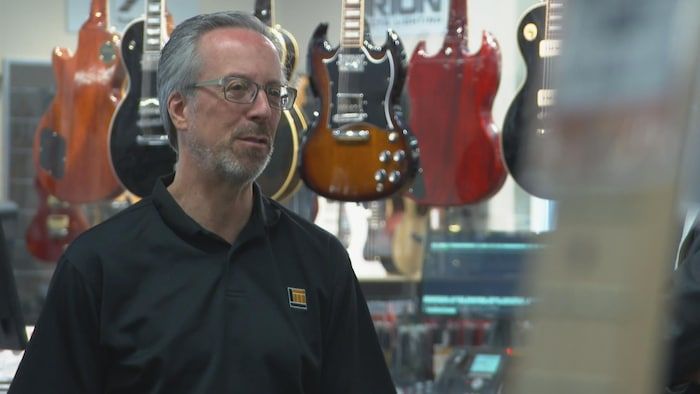The new provisions of law 96, which will come into force on June 1, will force Quebec merchants to make more space in French in their display and on store packaging. One month before the deadline, some say they fear for the survival of their trade, but the Legault government does not intend to retreat.
Quebec consumers are expected to see major changes in a few weeks.
Under the law on the official and common language of Quebec, French, commonly known as loi 96
the French must be clearly predominant
On the signs of all the shops in the province from June 1, which means that it will have to occupy twice as much space as a registration in another language.
Companies whose names are in English must therefore make fixes which, in some cases, require major work.
The Canadian company draws, for example, which has nearly a hundred branches in Quebec, will have three choices: adding a French -speaking description such as hardware
in large characters, add several words to the facade as low prices
To describe what is found inside or completely remove the name of the store to display only the logo.
The other brands affected by legislative changes include Home Depot, Best Buy, Linen Chest, Winners, Toys “R” US, Foot Locker and New Look, to name a few.
For some companies, these are invoices that exceed the ten millions of dollars
deplores Michel Rochette, President for Quebec of the Canadian Retail Council (CCCD). It is a big headache for many.
There are companies that will not succeed
he worries.
Several of them have been in steps since last year to make the changes requested without having obtained the necessary authorizations from the Quebec Office of the French language (OQLF), the municipality or the owner of the building they occupy.
Sometimes, for a few inches or a few centimeters, you have to return to the drawing board and somehow reinvent the display
explains Michel Rochette.
Finished, packaging in English
However, it is not the display rules that annoy the Long & Mcquade company. In his case, the name on the facade is a surname – a family name – and the businesses that use one can continue to do so (like Tim Horton’s and McDonald’s, for example).
What poses a problem for this music instruments retailer is that many items in stores are sold in packaging on which information is only written in English.
If, tomorrow, we had to remove the non -compliant products from our tablets, we would no longer have guitar strings for sale
explains Yvan Moreau, consultant to schools for Long & Mcquade.

Open in full screen
Yvan Moreau, consultant to schools for Long & Mcquade, estimates that at least 85 % of the products sold in store do not meet new regulatory requirements.
Photo : Radio-Canada
In the Quebec branch, he shows us the display where they are. The two main manufacturers, Ernie Ball and Addario, are American and do not translate anything from what they send to the province. Law 96, however, stipulates that a description in French must be on all products.
If the government does not move, warns Sébastien Caza, man manager of Long & Mcquade, it is not complicated: all music stores will close.
[Les cordes de guitare]this is our bread and our butter. It’s like, in a convenience store, selling beer or milk. We need to sell this. In a music store, the world of guitar […]it is between 70 and 80 % of turnover.
All wireless microphones used The Voice, Star Academyprofessional musicians, what they use, Sennheiser, Shure, Nady, it’s all in English
he argues.
Mr. Caza argues that he agrees with the principle of protection of the language and that his company, which has nearly twenty branches in Quebec, has been engaged in a francization approach for years.
However, he considers that it is impossible to move foreign companies that do business everywhere on the planet. We asked to Fender: “Are you going to put French on your boxes?” They replied: “No, the market [du Québec] is too small. “
The province would only represent half of the world’s world sales.
-There, I must admit that we have just pogged a wall
he said.
The fear of many in the industry is that these products are removed from the shelves and that they are found on online sales sites to which Quebec consumers could turn.
No question of backing up, says Quebec
The Minister responsible for the French language does not flinch before criticism.
The Quebecer who goes to a store must be able to take the object and find somewhere a description of the object he buys
says Jean-François Roberge. There must be a description in French, okay? We don’t get by. The law is clear in this regard.
Quebecers, they want to be able to read a French description of the product they buy. This is the minimum.
In the event that a manufacturer does not respect this principle, he explains that retailers can affix a label or tights on the product on the shelves. This solution is not not possible
however, judges Sébastien Caza, long & Mcquade, given the amount of work and the investments that this implies.
As for the possibility that the situation benefits the web giants, the Minister ensures that the provisions of Law 96 will also apply to them.
It is not true that online traders and then internationals will come to do unfair competition to Quebec merchants who comply
he said. I undertake that there is equity.
The multinational merchant who wants to sell products that are non -compliant, he will be chased by theOqlfthen he will pay.
A period of grace and adjustments
There is still enough to reassure owners of music instrument stores. In theory, the new rules will also prevent them from selling devices on which are inscriptions in English.
Guitars, keyboards, amplifiers and consoles with buttons tone
, level
et treble
would thus be removed from traffic.
We found a solution
says Jean-François Roberge without giving more details. He will make the details known soon.
We are not going to prevent Quebecers from accessing musical instruments
he said. We will find a way of doing things.
There will also be a room for maneuver
For companies that must make changes to their display.

Open in full screen
The Minister responsible for the French language, Jean-François Roberge, requires that changes be “underway” among the companies that must modify their display on June 1.
Photo : Radio-Canada
Everyone, I think, understands the measure, but not everyone has yet made the necessary changes
points out the minister. Some of them should not be ready.
If the new brands are not installed on June 1, companies will not automatically receive the visit to theOqlfbut the changes must at the very least be in progress
. A merchant who would have asked for his license but who has not yet set up his storefront, for example, would be a sort of forgiven.
The Legault government, however, remains firm on the principle.
This is a question that when you circulate in a shopping center or in a commercial street of the only French -speaking nation in America, it must appear
tranche Jean-François Roberge.
Quebec estimates that these changes will require investments of around $ 50 million to the province’s commercial sector.
Those who will not comply with fines of $ 3,000 to $ 30,000 per day for a first offense, from $ 6,000 to $ 60,000 per day for a second offense and from $ 9,000 to $ 90,000 per day in the case of a third offense.








